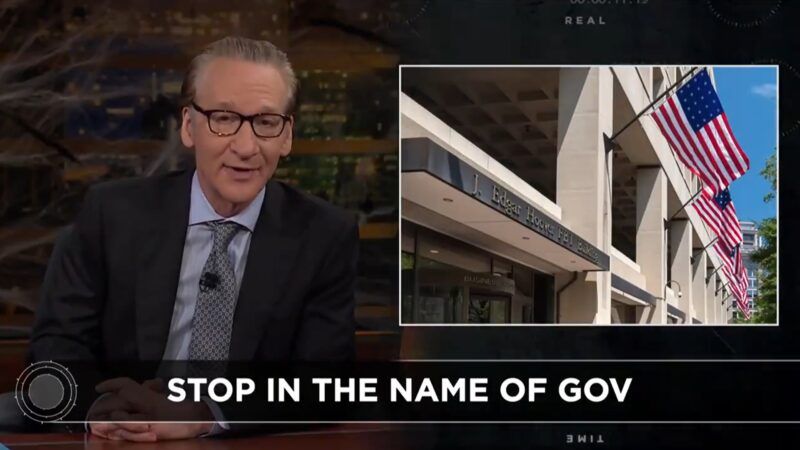Bill Maher Attacks 'the Real Deep State' of Government Regulators, Administrators, and Zoning Officers
The comedian blames America's endless reams of regulatory red tape for slowing down new wind farms, housing, and public toilets.

Bill Maher is the latest convert to the idea that America's addiction to regulatory process and public input is preventing us from having nice things like renewable energy and new housing.
In a Friday monologue on his HBO show Real Time, Maher laid into "the real deep state" of "regulators, administrators, contract reviewers, project managers, fee accessors, special commissioners, zoning officers, and consultants whose job seems to be to make sure that nothing ever happens and then charge you for it."
It's not that America isn't able to get anything done anymore it's that we're not allowed to. pic.twitter.com/MtbXgzlXEK
— Bill Maher (@billmaher) October 28, 2023
Specifically, the comedian called out federal permitting regulations for taking nearly two decades to approve a transmission line that will connect a wind farm in Wyoming with consumers in Nevada, and he mocked San Francisco's bureaucracy for turning a privately gifted public toilet into a $1 million project.
That same San Francisco bureaucracy, Maher notes, takes 627 days to permit a new home.
"Sure, there are people living on the streets, but that's because we want to make sure the apartments they don't live in are perfect," he said.
The situation in San Francisco might actually be even worse than Maher's description. A recent state audit of the city's housing policies and practices put the average time for fully permitting a residential project at 1,128 days—a little over three years. Reason has covered multiple episodes where the city fined developers for building more units than the zoning code allows and ordering existing, occupied (but unpermitted) homes to be dismantled.
Maher has a history of complaining about the pettier forms of government regulation and America's failure to build big projects like we used to. His latest rant hits some novel notes by focusing on the ways that the country's complex, highly participatory regulatory process—where an endless parade of bureaucrats, third-party groups, and concerned citizens all get a say—makes building an unnecessarily long, expensive prospect.
He's echoing the general critique of mostly liberal "abundance agenda" writers and activists, who think America's main problem is that we don't have enough stuff—and that we don't have enough stuff because we make building new stuff needlessly difficult.
There's a lot to recommend about this worldview, which echoes longstanding libertarian critiques of the regulatory state. There are good reason for libertarians to be suspicious of abundance-agenda liberalism as well, given how easily it conflates the need to deregulate private economic activity with the desire to speed up the construction of government-subsidized megaprojects.
Still, it's refreshing to hear liberals blaming regulations, and not just a lack of government funds, for holding back new infrastructure and new housing.
Environmental permitting and zoning policy have a (deserved) reputation for being dry, technical issues only the most obsessive policy wonks could really get excited about. They are also policy areas that have a profound—and profoundly negative—impact on where we live and how much we pay to keep the lights on.
Maher's rant is a glimpse into a world where all this cost-increasing red tape is the subject of productive populist rage: The big guys are out to get you by keeping new homes and power plants in interminable regulatory limbo.
Rent Free is a weekly newsletter from Christian Britschgi on urbanism and the fight for less regulation, more housing, more property rights, and more freedom in America's cities.


Show Comments (192)